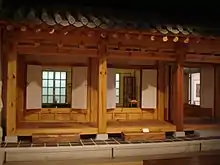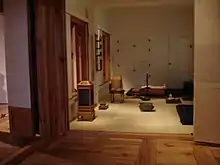Bang (Korean)
Bang is a romanization of the Korean word 방, meaning "room". In a traditional Korean house, a sarangbang (Hangul: 사랑방; Hanja: 舍廊房) is the study or drawing room, for example.
| Bang | |
 Traditional Korean sarangbang (study room). Exterior, in the British Museum Department of Asia. | |
| Korean name | |
|---|---|
| Hangul | |
| Hanja | |
| Revised Romanization | bang |
| McCune–Reischauer | pang or bang[1] |

In modern Korea (especially in the South), the concept of a bang has expanded and diversified from being merely a walled segment in a domestic space, to including buildings or enterprises in commercial, urban, space, such as a PC bang (an internet café), a noraebang (a karaoke room), sojubang (a soju room, i.e. a pub), manhwabang (a manhwa room, where people read or borrow manhwa) and a jjimjilbang (elaborate Korean public bathhouse). This can be compared with the similar expansion of the concept of a "house" to include upper houses, opera houses, coffee houses, and publishing houses.
Phonetically more tensed word ppang (빵) is used as an abbreviation of a noun gambang[2] (Hangul: 감방; Hanja: 監房; McCune-Reischauer: kambang), meaning "jail".
Multibang

Multibang is a kind of entertainment venue in South Korea where people can play video games and board games. In addition, they can eat snacks, drink non-alcoholic beverages, sing, and watch films.[3]
Notes
- The former is transcribed when the consonant ㅂ is voiceless phonetically, and the latter is transcribed when it is voiced.
- Generally it is pronounced as kkamppang (Hangeul: 깜빵).
- S Kwaak, Jeyup (19 July 2011). "Evolution of Korean 'bang' culture". travel.cnn.com. Retrieved 2015-10-15.
References
- "City of the Bang". Ninth Architecture Biennial of Venice 2004. Retrieved 2005-06-16.
- ""Bang" Culture". Just a Hakwon. Archived from the original on 2005-04-27. Retrieved 2005-06-16.
- Roman and Daniela Jost. "Sarangbang (Sarang-bang, Sarang Chae, Anchae) Korean Men's and women's quarters". Traditional Korean and Japanese furniture. Retrieved 2005-06-16.
- "Korean Housing". Archived from the original on 2005-02-06. Retrieved 2005-06-16.